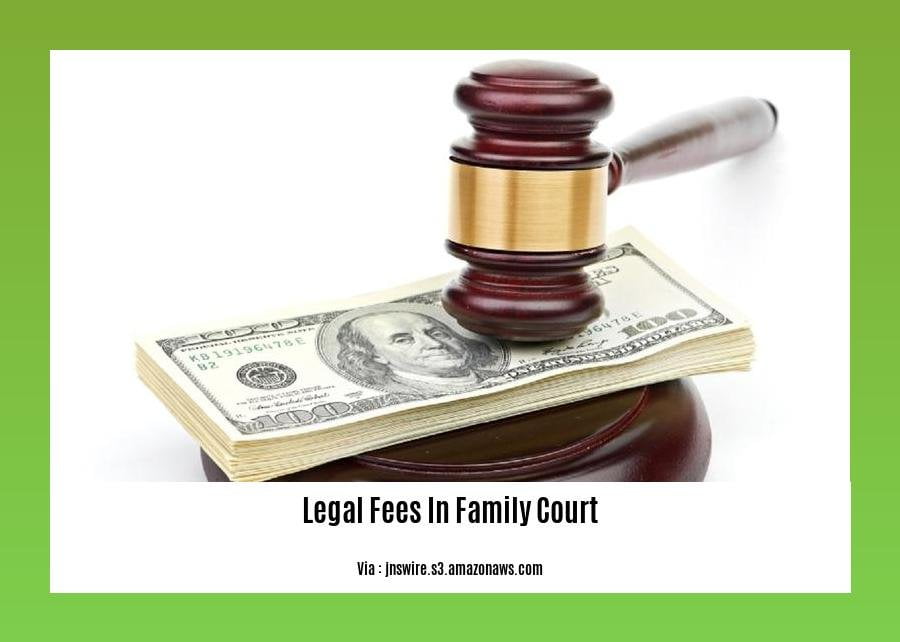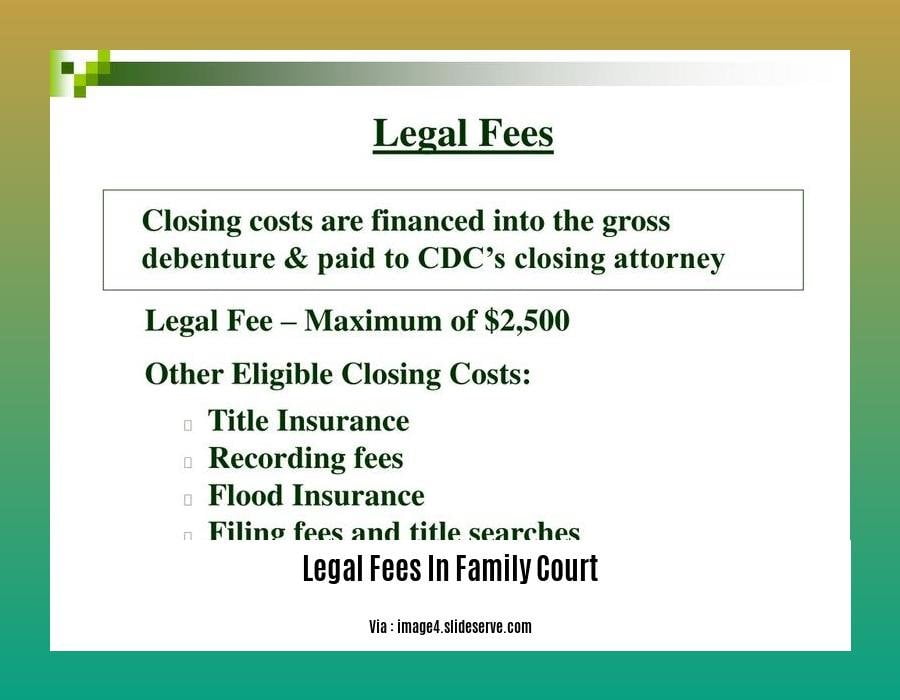When it comes to family court proceedings, understanding your rights and options regarding legal fee disputes is crucial. The question of whether you can sue for legal fees in family court is a common one, and it’s important to have a clear understanding of the complexities involved. In this article, we will delve into the intricacies of legal fee disputes in family court, providing comprehensive insights and shedding light on your rights and options. By the end, you will have a clearer understanding of the process and be better equipped to navigate any legal fee disputes that may arise in your family court case.
Key Takeaways:
- In family court, it is generally not possible to recover legal fees if you lose your case.
- However, if one party has a significantly better financial position, the court may award attorney’s fees.
- The petitioning spouse must provide evidence of their need for attorney fees.
- It is uncommon in family law to recover attorney’s fees as a punishment.
- A costs order can still be made regardless of whether a party has legal aid or not.
- The decision to award attorney’s fees considers the financial resources of both parties.
- Noncompliant parties cannot request attorney fees, suit money, or costs.
- Seeking costs in court for children law proceedings is based on reasonableness rather than punishment.
Can you sue for legal fees in family court

When it comes to legal fees in family court, many people wonder if they have the right to sue for them. In this article, we will explore the nuances of suing for legal fees in family court and help you understand your rights and options.
Understanding the General Rule
In family court, the general rule is that you cannot recover legal fees if you lose your case. Each party is typically responsible for their own attorney’s fees. This means that even if you feel that the other party is at fault or should be held accountable for your legal expenses, you may not have the ability to sue for those fees.
Exceptions to the Rule
While the general rule may be discouraging, there are exceptions. If one party is in a significantly superior financial position compared to the other, the court may award attorney’s fees to level the playing field. This means that if your spouse or the opposing party has significantly more financial resources than you, the court may order them to pay for your legal fees.
Proving the Need for Attorney’s Fees
To receive an award of attorney’s fees, the petitioning spouse must prove their need for the award. This typically involves demonstrating a significant disparity in financial resources between the parties. The court will consider factors such as income, assets, earning potential, and overall financial stability when determining the need for attorney’s fees.
Purpose of Attorney’s Fees Awards
It’s important to note that in family law, it is uncommon to recover attorney’s fees solely as a sanction or punishment. The purpose of awarding attorney’s fees is to ensure both parties have access to legal representation and to maintain fairness in the legal process. It is not intended to punish the opposing party, but rather to level the playing field and protect the financially disadvantaged spouse.
Financial Resources of Both Parties
When deciding whether to award attorney’s fees, the court takes into account the financial resources of both parties. This means that if both parties have a similar financial standing, the likelihood of receiving an award decreases. The court aims to make a decision that is fair and proportionate to each party’s financial situation.
Considerations for Noncompliance
It’s important to note that a party cannot ask for attorney’s fees, suit money, or costs if they have been noncompliant in the proceedings. This means that if you have failed to comply with court orders, fail to cooperate during the process, or engage in behavior that inhibits the progress of the case, you may not be eligible to seek reimbursement for legal fees.
Costs Orders
Even if a party is not awarded attorney’s fees, a costs order may still be made. A costs order allows for reimbursement of certain expenses related to the legal process, such as court filing fees or costs of obtaining necessary documents. This can provide some relief for the party who has incurred these expenses.
Seeking Costs in Children Law Proceedings
In children law proceedings, seeking costs is more about reasonableness rather than punishment. The court will consider the conduct of the parties and may make an order for costs if it deems it appropriate and reasonable. This can help offset the expenses incurred during the legal process.
Conclusion
While it can be challenging to sue for legal fees in family court, there are exceptions and circumstances where the court may award attorney’s fees. By understanding the rules and guidelines surrounding these awards, you can better navigate the complexities of family court proceedings. It’s important to consult with a seasoned family law attorney to determine the best course of action for your specific situation.
Looking for the best divorce lawyer in Navi Mumbai? Look no further! Our top-rated divorce lawyer in Navi Mumbai will provide you with expert guidance and support throughout the legal process. Don’t hesitate, click here to connect with the best divorce lawyer in Navi Mumbai now: Best divorce lawyer in Navi Mumbai
In need of a skilled and compassionate female divorce lawyer? We understand the unique challenges women face during divorce proceedings. Click here to access the services of the best female divorce lawyer: Best female divorce lawyer
Curious about the causes of domestic violence in India? Uncover the underlying factors contributing to this complex issue by clicking here: Causes of domestic violence in India
Exploring the Legal Basis for Suing for Legal Fees in Family Court

Key Takeaways:
– In family court, the general rule is that each party is responsible for their own legal fees.
– However, there are exceptions to this rule based on the financial positions of the parties and the specific circumstances of the case.
– One circumstance in which attorney’s fees may be awarded is when there is a significant disparity in financial resources between the parties.
– The petitioner must prove their need for attorney’s fees, demonstrating that they lack the financial resources to pay for legal representation.
– Attorney’s fees are typically awarded to level the playing field and ensure access to legal representation.
– The court also considers the financial resources of both parties when deciding whether to award attorney’s fees.
– Noncompliance with court orders or hindering the progress of the case may affect a party’s eligibility for seeking reimbursement of legal fees.
– Even if attorney’s fees are not awarded, the court may still issue a costs order to reimburse certain expenses related to the legal process.
– In children law proceedings, seeking costs is more about reasonableness than punishment.
– It is advisable to consult with a family law attorney to understand the best course of action for your specific situation.
In family court, the general rule is that each party is responsible for their own legal fees. However, there are certain circumstances in which one party may be awarded attorney’s fees. This article will delve into the legal basis for suing for legal fees in family court and explore the factors that influence the court’s decision.
One circumstance in which attorney’s fees may be awarded is when there is a significant disparity in financial resources between the parties. If one party has considerably more financial means than the other, the court may award attorney’s fees to the party in need in order to level the playing field. This ensures that both parties have access to legal representation and supports fairness in the proceedings.
To receive an award of attorney’s fees, the petitioner must prove their need for the fees. They must demonstrate that they lack the financial resources to pay for legal representation and require the assistance of an attorney. The court will carefully consider this evidence when deciding whether to award attorney’s fees.
It is important to note that attorney’s fees are usually awarded as a sanction or punishment in family law cases. This means that they are not commonly awarded solely on the basis of requesting reimbursement for legal expenses. The court takes into account the financial resources of both parties and the specific circumstances of the case before making a decision.
However, even if attorney’s fees are not awarded, it is still possible for the court to issue a costs order. A costs order is a court order that requires one party to pay the legal costs of the other party, regardless of their financial situation. This means that certain expenses related to the legal process may still be reimbursed, even if attorney’s fees are not awarded.
In children law proceedings, seeking costs is more about reasonableness than punishment. The court will consider the reasonableness of each party’s actions and behavior, as well as their financial resources, when determining whether to make a costs order.
It is important to consult with a family law attorney to understand the best course of action for your specific situation. A knowledgeable attorney can provide valuable guidance on your rights and options regarding legal fee disputes in family court. They can assess your financial situation and help you determine whether pursuing attorney’s fees or a costs order is appropriate in your case.
Sources:
1. Can you sue for legal fees in family court?
2. How Do I Get the Other Side to Pay My Attorney’s Fees?
## Common Challenges and Considerations When Suing for Legal Fees
When facing a legal case, the prospect of paying hefty attorney fees can be overwhelming. However, in certain situations, it may be possible to sue for legal fees in family court. Understanding the common challenges and considerations associated with this process is crucial in order to navigate the complexities of family court proceedings effectively. In this article, we will explore the key factors to keep in mind when contemplating the possibility of suing for legal fees.
### Factors Affecting Legal Fee Recovery
Before delving into the intricacies of suing for legal fees in family court, it's important to understand the factors that can impact the recovery of these fees. The complexity of the case, the reasonableness of the fees charged, and the specific laws and regulations in your jurisdiction all play a role in determining the amount of legal fees that can be recovered. It's advisable to consult with an experienced attorney who can provide insights tailored to your particular circumstances.
### Understanding Fee Recovery Laws
When it comes to suing for legal fees, it's essential to familiarize yourself with the laws and regulations governing fee recovery in your jurisdiction. The "American Rule" is typically followed in the United States, where each party is responsible for their own attorney fees unless there is a specific statute or contract provision allowing for fee recovery. Research and consultation with a knowledgeable attorney can help you determine if you have a valid claim to recover legal fees.
### Challenges in Proving Financial Disparity
One of the common challenges when suing for legal fees in family court is proving a significant disparity in financial resources between the parties involved. While recovering legal fees can be a crucial aspect of maintaining fairness and ensuring access to legal representation, courts typically require evidence to support the claim of financial need. This can involve demonstrating that you lack the financial means to pay for legal representation and that you require assistance to level the playing field.
### Noncompliance and Its Impact
Noncompliance with court orders or hindering the progress of the case can have implications for seeking reimbursement of legal fees. Family courts typically consider the conduct of both parties when deciding whether to award attorney's fees. Any actions that impede the smooth progression of the case or violate court orders can impact the likelihood of fee recovery. It's important to adhere to court orders and act in a manner that aligns with the rules and regulations governing family court proceedings.
### Alternatives: Costs Orders and Reasonableness
In situations where attorney's fees may not be awarded, the court may still order one party to pay the legal costs of the other, regardless of their financial situation. It's important to note that seeking costs is often more about reasonableness than punishment in family court proceedings. The court may consider various factors, such as the reasonableness of the legal fees incurred and the financial positions of the parties, when making a decision regarding costs.
### Key Takeaways:
- Recovering legal fees in family court is possible in certain circumstances, particularly when there is a significant disparity in financial resources between the parties involved.
- Understanding the factors that impact legal fee recovery, such as the complexity of the case and the reasonableness of the fees charged, is crucial when contemplating suing for legal fees.
- Familiarize yourself with the specific laws and regulations governing fee recovery in your jurisdiction to determine if you have a valid claim.
- Proving financial disparity between the parties can be a challenge when seeking reimbursement of legal fees.
- Noncompliance with court orders or obstructing the progress of the case can affect the chances of recovering legal fees.
- In situations where attorney's fees are not awarded, the court may still order one party to pay the legal costs of the other based on reasonableness.
Sources:
- [FindLaw - Can I Sue for Legal Fees?](
- [Rey Abogado - Can You Sue for Legal Fees in the US?](
Alternatives to Suing for Legal Fees in Family Court
Key Takeaways:
– Suing for legal fees in family court is not always the only option for recovering legal costs.
– Alternative options may be available depending on the circumstances of the case and the jurisdiction.
– It is important to understand these alternatives to make informed decisions about pursuing legal fee recovery.
In family court, the general rule is that each party is responsible for their own legal fees. However, there are situations where one party may seek reimbursement for their legal costs. While suing for legal fees is one option, there are alternatives worth exploring. Let’s delve into the available alternatives:
1. Negotiation and Mediation
In many cases, it may be possible to resolve legal fee disputes through negotiation and mediation. By engaging in open and transparent communication, both parties can discuss their concerns and work towards a mutually acceptable resolution. Mediation provides a structured process where a neutral third party facilitates discussions and helps parties reach an agreement. This can be a more cost-effective and amicable approach compared to pursuing a formal lawsuit.
2. Fee Agreements
Before commencing legal proceedings, it is essential to have a clear fee agreement in place with your attorney. A fee agreement outlines the terms and conditions regarding legal fees and can provide clarity on how costs will be managed throughout the case. By having a well-defined fee agreement, both parties can have a better understanding of their financial obligations and reduce the potential for disputes down the line.
3. Court-Ordered Costs
While the court may not award attorney’s fees in every case, it has the discretion to order one party to pay certain costs associated with the legal process. This can include expenses such as court fees, document preparation, or expert witness fees. While court-ordered costs may not cover the entire legal fees, they can provide some relief and help offset the financial burden.
4. Legal Aid and Pro Bono Services
In situations where individuals are unable to afford legal representation, legal aid organizations and pro bono services may be available. These organizations provide free or low-cost legal services to individuals who meet their eligibility criteria. Seeking assistance from legal aid or pro bono services can help individuals navigate family court proceedings without incurring substantial legal fees.
5. Reaching a Settlement
Resolving disputes through a settlement agreement can be a viable alternative to pursuing legal fee recovery. By reaching a mutually acceptable resolution, both parties can avoid the time, costs, and uncertainties associated with litigation. Settlement agreements can help preserve relationships, reduce stress, and provide a more efficient resolution to legal disputes.
Navigating the complexities of legal fee disputes in family court requires careful consideration of all available options. While suing for legal fees is one option, it is important to explore alternatives that may lead to a more cost-effective and efficient resolution. By understanding these alternatives and working with experienced legal professionals, individuals can make informed decisions about their rights and options in family court.
Sources:
– JurisGuru – Legal Fees in Family Court
– FCFCoA – Legal Costs
FAQ
Q1: Under what circumstances can you sue for legal fees in family court?
A1: You may be able to sue for legal fees in family court if you can prove certain circumstances, such as contempt of court, frivolous litigation, income variation between parties, or special circumstances. However, it is important to consult with an attorney to understand the specific requirements in your jurisdiction. (Source: Juris Guru, FindLaw)
Q2: Are there alternative options for legal fee recovery in family court?
A2: While it is generally the responsibility of each party to pay for their own legal fees in family court, there are certain situations where the court may order one party to pay the legal costs of the other. However, it is important to note that these cases are exceptions rather than the norm. (Source: Family Court of Australia)
Q3: What factors should be considered before suing a family member for legal fees?
A3: Before deciding to sue a family member for legal fees, it is crucial to assess whether there is a legitimate legal dispute. Family disputes can often arise from personal grievances, so it is important to determine if the situation warrants legal action before proceeding. Consulting with an attorney can provide valuable guidance in evaluating the legitimacy of the dispute. (Source: FindLaw Legal Blogs)
Q4: Is it possible to recover attorney fees in a lawsuit?
A4: Yes, in some situations, it is possible to sue to recover attorney fees in a lawsuit. This can be particularly beneficial in long or complex cases where legal fees can add up significantly. The ability to recover legal fees, however, may vary based on the jurisdiction and the specific circumstances of the case. Consulting with an experienced attorney is advisable to understand the laws and rules governing fee recovery in your jurisdiction. (Source: FindLaw)
Q5: How should I navigate the process of recovering legal fees in family court?
A5: To navigate the process of recovering legal fees in family court, it is crucial to seek the guidance of an experienced attorney. They can provide comprehensive insights into the laws and regulations surrounding legal fee disputes and help you understand your rights and options. An attorney can assist in gathering the necessary evidence and presenting a compelling case to demonstrate the need for attorney’s fees. (Source: Juris Guru)
- China II Review: Delicious Food & Speedy Service - April 17, 2025
- Understand Virginia’s Flag: History & Debate - April 17, 2025
- Explore Long Island’s Map: Unique Regions & Insights - April 17, 2025
















